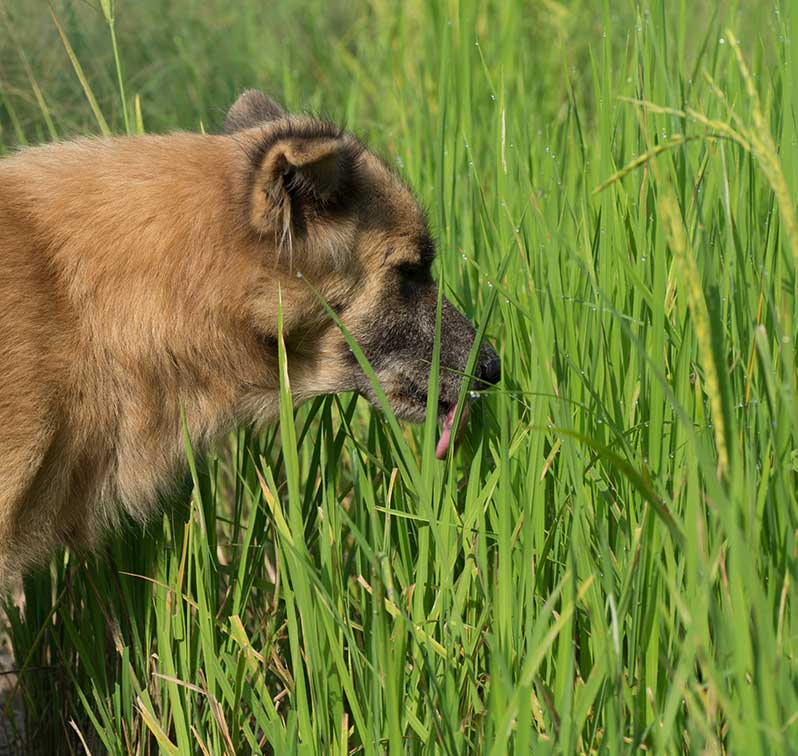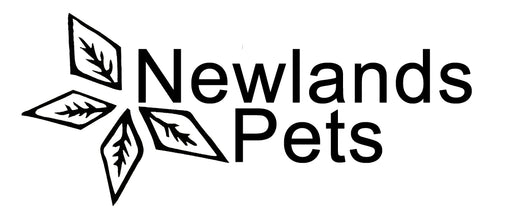
Why is my dog eating grass?
There probably isn’t a day that goes by where I’m not asked “why does my dog eat grass”. This behaviour can be both confusing and concerning if unexpected. But you’ll be pleased to hear that a large percentage of the time it’s nothing to worry about.
Let’s look at grass eating.
Dogs eating grass is a form of what’s known as pica. This is a whereby an animal eats something that isn’t a natural part of their diet.
The truth is that no one is 100% sure why dogs eat grass and the behaviour has even been seen in wild dogs as well as domestic pets. Having said that, over the years we’ve noticed a few patterns which are known to be associated with the behaviour and lead to more grass eating.
Different types of grass eating.
There are two main types of grass eating in dogs. Either the dog will graze on grass from time to time in the garden or on walks. Or the dog will eat grass ferociously almost as if they can’t get enough. The latter can be to purposely make themselves sick as large amounts of grass can help induce vomit.
So what can lead to grass eating?
Diet.
Grass eating can often be associated with an upset stomach and gastric distress. Over the years we’ve very rarely had a dog which eats a lot of grass which is also eating a good quality diet. These days, many dogs are fed diets containing ingredients which dogs will often find very hard to digest. The grass eating can be associated with some part of their diet that they’re finding hard to cope with. More often than not a move to diets which aren’t so heavy in grains or fillers can reduce or eradicate this behaviour.
Could it be fibre?
One study published in 2006 covers a Poodle which ate grass to the point of vomiting for many years. The diet of the dog was changed to one which contained more fibre and within a few days the dog stopped eating grass and the vomiting also stopped. The owners were questioned regularly, and the behaviour and vomiting disappeared for 13 months. At which point follow-ups were stopped. In this particular case the dog was moved from a commercial diet to a high fibre diet.
Boredom.
Your dog may just be bored. You’ll probably know quite quickly whether this is the case. If your dog stops while playing to munch on a bit of grass this is probably not the case. However if you mainly see the grass eating when they’re in the garden alone it may be worth looking at ways to stimulate your dog a bit more.
Habit.
Once dogs start something sometimes it can be hard to stop them. Grass eating has been found to become a habit for some dogs. If this is the case it may be worth talking to a trainer to help you.
So what should you do?
If your dog is healthy and just very occasionally eating a little bit of grass from time to time then don’t worry. It’s more than likely nothing to worry about. However if your dog is eating quite a lot of grass or has periods of time where they’re eating ferociously it may be worth looking at.
What to do next.
Take a look at your dog’s diet. Pay special attention to any filler ingredients present in foods. These will mainly be in the form of grains which dogs can get little to no nutritional value from. Don’t forget about treats! Everyone concentrates on the actual food and forgets how many treats they’re giving. Treats can also be full of all manner of food which dogs find hard to digest. If you think that your dog may have an issue either pop into the shop or get in contact as we’re always happy to help.

Leave a comment